

Accommodations for Students with ADHD.
Test Anxiety. New ‘Dyslexie’ font helps dyslexics read better AFP/ Those in a study of the font say it improves reading accuracy.

A graphic designer from the Netherlands, Christian Boer, has developed a new font to aid his dyslexia. The font, called Dyslexie, isn’t the first of its kind, but according to Scientific American in an article published Wednesday, “it has received much fanfare from sufferers.” Boer first designing his font in 2008 while studying at the University of Twente in the Netherlands, and in 2010 a fellow student conducted an independent study on the font as part of a master s thesis project. Participants in the study said the font improved their reading accuracy and allowed them to read for longer periods of time before tiring. According to Scientific American, the font tweaks letters of the alphabet that are commonly misread, such as d and m, to make them easier to recognize. Bright Solutions for Dyslexia. Toolbelt Theory for Everyone.
How will your students communicate when they leave school?
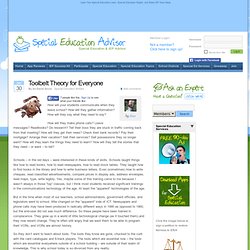
How will they gather information? How will they say what they need to say? Dyslexia Teacher - Your letters. I am a Special Needs co-ordinator at a main stream junior school in England and mum and aunt of dyslexic boys! I have two Grade/Year 5 students very evenly matched in the support they need. Last week I set about a new approach to teaching them the phonic skills.
I felt they needed a more multisensory approach, including listening to the specific sound, listening for it in a given word and identifying it, and also seeing the sound written and having the opportunity to write the word themselves. Disability Services-Resources for Faculty. Some Types of Learning Disabilities. Some Types of Learning Disabilities — The First Step is Understanding Some types of learning disabilities can be "treated" through proper testing and training.
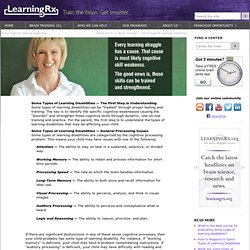
The key is to identify the specific cognitive weaknesses causing the "disorder" and strengthen those cognitive skills through dynamic, one-on-one training and practice. How to Overcome Nervousness & Anxiety - Overcoming Test Anxiety Naturally. Test anxiety is often treated using conventional prescription medicine.

While there is a place for prescription medication, in certain cases of test anxiety, careful consideration and caution should be taken regarding possible side effects. Misunderstood Minds . Resources. The following resources offer material you can use to become more informed about learning disabilities and differences.
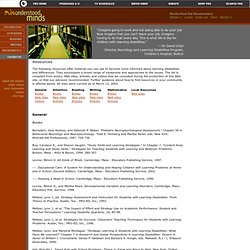
They encompass a broad range of viewpoints and approaches to the issues. The list is compiled from books, Web sites, articles, and videos that we consulted during the production of this Web site, or that our advisors recommended. Further guidance about how to find resources in your community is offered below. All links were current as of March 13, 2002. General Books Bernstein, Jane Holmes, and Deborah P. Explaining Executive Function. SAS Tour - CSanta22. Creative Organization for Disorganized People. Feel guilty about it?
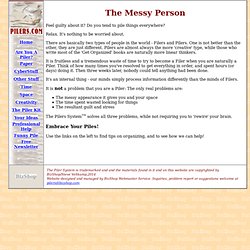
Do you tend to pile things everywhere? Relax. It's nothing to be worried about. There are basically two types of people in the world - Filers and Pilers. One is not better than the other, they are just different. The Psychology of Stacking. Getting Hands-On With Fine-Motor Skills. Three Brain-based Teaching Strategies to Build Executive Function in Students. Updated 01/2014 For young brains to retain information, they need to apply it.
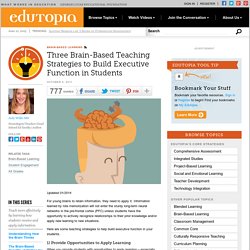
Information learned by rote memorization will not enter the sturdy long-term neural networks in the pre-frontal cortex (PFC) unless students have the opportunity to actively recognize relationships to their prior knowledge and/or apply new learning to new situations. Here are some teaching strategies to help build executive function in your students. 1) Provide Opportunities to Apply Learning When you provide students with opportunities to apply learning -- especially through authentic, personally meaningful activities -- and then provide formative assessments and feedback throughout a unit, facts move from rote memory to become part of the memory bank. These opportunities activate the isolated small neural networks of facts or procedures, which then undergo the cellular changes of neuroplasticity that link them into larger neural circuits of related information. 3) Model Higher Thinking Skills.
Accommodations & Modifications ... Dysgraphia. Executive Function. Executive Function...
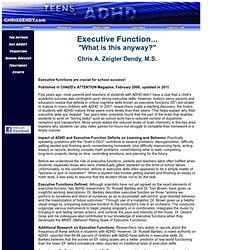
"What is this anyway? " Chris A. Zeigler Dendy, M.S. Executive functions are crucial for school success! Published in CHADD's ATTENTION Magazine, February 2008; updated in 2011. Five years ago, most parents and teachers of students with ADHD didn't have a clue that a child's academic success was contingent upon strong executive skills. Learning Disabilities. Why Children Fail in School: Top Ten Reasons Students Struggle & Strategies to Help Them Succeed. Do you have a child who is struggling academically?
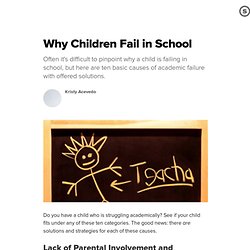
See if your child fits under any of these ten categories. The good news: there are solutions and strategies for each of these causes. Lack of Parental Involvement and Absenteeism The impact parents have on the academic success of their children is immeasurable. Misunderstood Minds . Math Difficulties. What Can Stand in the Way of a Student's Mathematical Development?
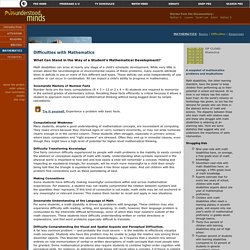
Math disabilities can arise at nearly any stage of a child's scholastic development. While very little is known about the neurobiological or environmental causes of these problems, many experts attribute them to deficits in one or more of five different skill types. Cooperative Learning. Guinevere Palmer, Rachel Peters, Rebecca Streetman Department of Educational Psychology and Instructional Technology, University of Georgia Review of Cooperative Learning Introduction Scenario Mrs.
ESL: English as a Second Language Resources for Teachers and Students. Are you learning how to speak English? You've come to the right place! Here, tutors have shared their knowledge so that you won't be confused as to what a preposition is. You can also brush up on irregular verbs and learn some cool new vocabulary strategies. If you still need help mastering the English language - we don't blame you!
Contact one of our awesome ESL tutors. Learning Disabilities in Children: Symptoms, Types, and Testing. What are learning disabilities? Learning disabilities, or learning disorders, are an umbrella term for a wide variety of learning problems. A learning disability is not a problem with intelligence or motivation. Kids with learning disabilities aren’t lazy or dumb. In fact, most are just as smart as everyone else. Their brains are simply wired differently. Simply put, children and adults with learning disabilities see, hear, and understand things differently. Accommodations and Modifications. Accommodations, modifications, and alternative assessments may be necessary for a special needs child to succeed while working on materials for learning. A student who cannot read nor write at grade level may be able to understand and participate in discussions about material that is read aloud and taught at the child's age-appropriate level. A child who cannot recall basic number facts may be able to do grade-appropriate problems using a calculator or working with number facts chart.
A student with cerebral palsy may be able to take part in modified physical education with special equipment and carefully chosen exercises. The terms accommodations and modification are frequently used interchangeably, but they are not identical in their effect on teaching and learning. There are important differences in the meaning as they relate to special needs education. Because IDEA is a federal law, it primarily guarantees an appropriate, free, public education. Understanding Accommodations. Tests Document Readability. How to Improve Study Skills in Middle School – Study Tips. The Write Stuff For Test Anxiety. Study and Test-Taking Strategies for Kids with Learning Difficulties - Academic skills. Effective study strategies are the gateway to school success, graduation, college entry, and job advancement. Reflecting on One-to-One Programs. More and more schools are bringing laptops, netbooks, and other mobile computing devices into the classroom.
Homework: Only Review What You Need to Review - Coach G's Teaching Tips. :focus. Inclusive Schools Network - Supporting Inclusive Education Worldwide - Inclusive Schools Network. Ten Steps to Better Student Engagement. Study Guides and Strategies. Teaching Practices for elementary school teachers in grades K-6 including lesson planning, substitute teacher resources, thematic units, teaching materials curriculum theory, classroom and teaching ideas resources. Study Skills. Once you have established a schedule to study you need to get the most out of that time.
Several things will help increase your effectiveness. As already mentioned, maintaining a regular schedule is one. Final Exam Study Tips: How to Maximize Test Scores and Improve Content Knowledge. In the 1973 film The Paper Chase, two law students flee the dormitory toward the end of the movie at the start of final exam week. Test Anxiety.
Listen. Knowing What Our Students Don’t Know Helps Them Succeed. The key to student success is not the test at the end – it’s knowing what they don’t know, in real-time. Skim First, Answer Later: A Textbook Study Strategy. If you've seen the tome of a textbook your middle schooler has been lugging around, you know that getting through a chapter is quite a chore, nevermind retaining important information. At-Risk Students Face E-Learning Challenges. Response: Several Ways To Help Students Become Better Listeners - Classroom Q&A With Larry Ferlazzo.